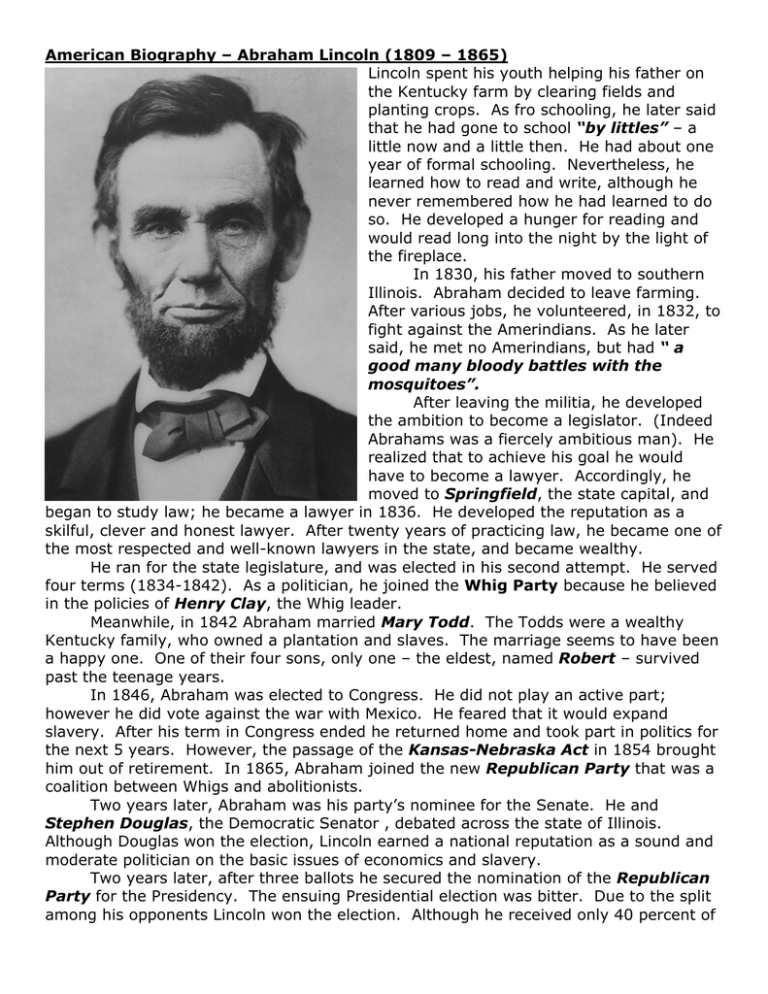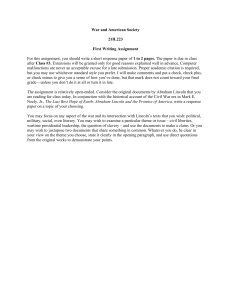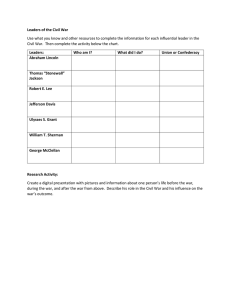American Biography – Abraham Lincoln (1809 – 1865)
advertisement

American Biography – Abraham Lincoln (1809 – 1865) Lincoln spent his youth helping his father on the Kentucky farm by clearing fields and planting crops. As fro schooling, he later said that he had gone to school “by littles” – a little now and a little then. He had about one year of formal schooling. Nevertheless, he learned how to read and write, although he never remembered how he had learned to do so. He developed a hunger for reading and would read long into the night by the light of the fireplace. In 1830, his father moved to southern Illinois. Abraham decided to leave farming. After various jobs, he volunteered, in 1832, to fight against the Amerindians. As he later said, he met no Amerindians, but had “ a good many bloody battles with the mosquitoes”. After leaving the militia, he developed the ambition to become a legislator. (Indeed Abrahams was a fiercely ambitious man). He realized that to achieve his goal he would have to become a lawyer. Accordingly, he moved to Springfield, the state capital, and began to study law; he became a lawyer in 1836. He developed the reputation as a skilful, clever and honest lawyer. After twenty years of practicing law, he became one of the most respected and well-known lawyers in the state, and became wealthy. He ran for the state legislature, and was elected in his second attempt. He served four terms (1834-1842). As a politician, he joined the Whig Party because he believed in the policies of Henry Clay, the Whig leader. Meanwhile, in 1842 Abraham married Mary Todd. The Todds were a wealthy Kentucky family, who owned a plantation and slaves. The marriage seems to have been a happy one. One of their four sons, only one – the eldest, named Robert – survived past the teenage years. In 1846, Abraham was elected to Congress. He did not play an active part; however he did vote against the war with Mexico. He feared that it would expand slavery. After his term in Congress ended he returned home and took part in politics for the next 5 years. However, the passage of the Kansas-Nebraska Act in 1854 brought him out of retirement. In 1865, Abraham joined the new Republican Party that was a coalition between Whigs and abolitionists. Two years later, Abraham was his party’s nominee for the Senate. He and Stephen Douglas, the Democratic Senator , debated across the state of Illinois. Although Douglas won the election, Lincoln earned a national reputation as a sound and moderate politician on the basic issues of economics and slavery. Two years later, after three ballots he secured the nomination of the Republican Party for the Presidency. The ensuing Presidential election was bitter. Due to the split among his opponents Lincoln won the election. Although he received only 40 percent of the popular vote, he received 57 Electoral College votes more than his three opponents combined. The latter assured him victory. Lincoln was not a popular President at first. Many people – including some in his own Cabinet – did not believe that he was able enough to serve as President. However, during his first term, he led the fight against the South, laid the economic foundations for modern America, kept the North united and supportive of the war, and emancipated the slaves. He was re-elected in 1864, and in his second inaugural address, he promised, “malice towards none and charity for all”. His philosophical attitudes may be understood in his excerpt from a speech to the 166th Ohio Regiment, August 1864. “…I almost always feel inclined, when I happen to say anything to soldiers, to impress upon them in a few brief remarks the importance of success in this contest. It is not merely for today, but all time to come that we should perpetuate for our children’s children this great and free government, which we have enjoyed all our lives. I beg you to remember this, not merely for my sake, but for yours. I happen temporarily to occupy this big White House. I am a living witness that any one of your children may look to come here as my father’s child has. It is in order that each of you may have through this free government which we have enjoyed, an open field and a fair chance for your industry, enterprise and intelligence; that you may all have equal privileges in the race of life, with all its desirable human aspirations. It is for this the struggle should be maintained, that we may not lose our birthright – not only for one, but for two or three years. The nation is worth fighting for, to secure such an inestimable jewel.” A year later, the War was over. The South was defeated and the Union was preserved. Slavery was ended. A few days after the surrender of General Lee, Lincoln was assassinated while watching a play. When he died, one of his Cabinet said, “Now he belongs to the ages”. At his death, Abraham was hailed as a martyr for the cause of the Union and the abolition of slavery. Myths and legends evolved about him. His sayings, such as, “government of the people, by the people and for the people”, became elevated to the heights of the words of the Declaration of Independence and the Constitution. Question for Thought: How did Lincoln represent the American Dream, the personal success through hard work, honesty, and abilities? Do you think he did represent the rise of the common people?




